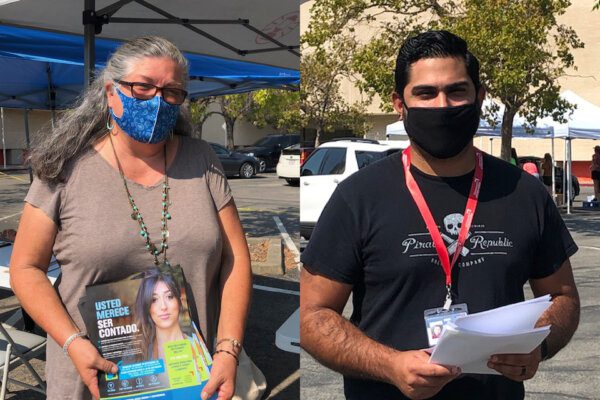
The Safety Net Services team offers community a first-line of response to meeting emergency needs in a crisis and provides a source of hope to many across Marin County. Whether that’s for energy or rent assistance, mortgage payment help, cash for car repairs or medicine, emergency food, or getting people housed, the team helps individuals and families daily. As part of the county’s safety net, they help people with immediate expenses, fill-in gaps, and support increased stability and moves toward self-sufficiency.
Laurel Hill, Safety Net Services Director, brings decades of experience from a variety of key roles across the agency to her leadership of the Safety Net Services team. Formed as its own department in late 2019 as a way to strengthen the agency’s whole-family approach, results have been impressive. Prior to March 2020 and the start of COVID, the team’s three staff members helped over 65 households annually with some sort of assistance. Now since COVID and given increased need (as well as more funding resources), the team has helped thousands to stay safe and stable.
Chris Miranda, Safety Net Services Manager, and Jazmelina Ledesma, who oversees the agency’s Low Income Home Energy Assistance Program (LIHEAP), have grown in their roles at an important time for community. “Both Chris and Jazz like helping people and they have a lot of empathy,” notes Laurel. She continues, “They both consistently go the extra mile, and they were two of the first people who wanted to come back (after COVID hit) and provide in person service. The two have made such an impact in the past 18 months to create a stronger response to the pandemic, bonds of deepened trust across Marin, and greater safety for many who were impacted negatively and want a helping, friendly connection during a time of increased uncertainty.”
Chris Miranda came to the agency as a Data Specialist and was identified early as a team member who exemplified the agency’s value of service. Chris was promoted twice in two years, ultimately to his current position as Safety Net Manager, and he recently took on increased responsibility overseeing client intake. The agency’s rental assistance expert, Chris was one of the first to step up and volunteer when people needed help but doors were closed due to shelter-in-place orders. Says Laurel, “When things went remote, Chris would meet people in a parking lot in person to help ensure they could get paperwork completed. He even printed documents for a woman whose husband had passed away and delivered them to her home.”
Jazmelina “Jazz” Ledesma continues to inspire hope in community. She assists those who come into the agency with energy needs, mostly with PG&E bills. Sometimes in West Marin, community members need help with firewood and propane, and Jazz gets that sorted out too.
As part of her job, Jazz finds out what people are eligible for across all safety net services offerings and then gets them assistance quickly. With a background in technology, Jazz made the transition to remote work easily. Says Laurel, “From the stories and feedback that Jazz receives from families, it’s obvious that she goes above and beyond and her computer skills have made her a mentor and teacher for many who need extra support with online applications.” While Jazz is only just now coming up on her one-year anniversary at CAM, she has quickly established herself as a team player. She’s educated herself about agency programs so that she can fill in for staff in other departments, she’s participated in agency-wide forums and has shown confidence and knowledge when meeting with Board members to talk about our programs.
Still, recovery is a journey and there are a whole lot of people in need. Community Action Marin is serving more people than ever, and Laurel and her team have been busy. People who receive services may be 9 – 12 months behind in rent, for example. Or someone finds out they qualify for energy assistance and it puts their mind at ease knowing they can pay for utilities and food. Once they receive help, they are so relieved. As Laurel says, “Recovery isn’t just about having money to pay bills, it’s also about well-being for more across our communities of low income and those who face unexpected situations. Happily, we’re here to help.”
